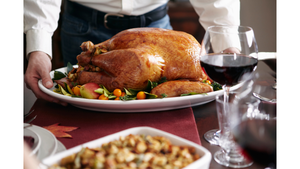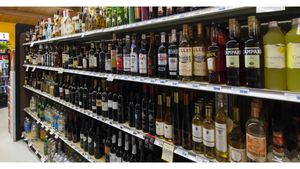A face-off
January 1, 2018
The produce aisle could soon resemble a child’s play room with popular kid-friendly characters and images decorating shelves.
Imagine and aisle within the grocery store. Picture shelves packed with colorful packages. Decorating the bags and boxes are images of popular cartoon stars and comic strips of characters participating in various activities. Standing at the end of an aisle is a life-size cut out of a smiling face that grabs the attention of passersby. Wide-eyed kids jump around with enthusiasm while mom packs the cart with snacks.
Does this conjure up an image of the produce department?
Produce companies are following the center store’s lead and teaming up with popular television and cartoon characters, or creating their own imagery and stories, to connect with kids and parents. Industry observers say it is working. Whether it is a simple sketch created in-house or a partnership with a national superstar, characters speak to consumers—especially kids—to help bring the department to life and promote healthy snacking.
This connection extends beyond the supermarkets’ walls; these characters are popping up on the web, in videos, social media, in-store and even in-person. With such a broad reach, it is important for retailers to team up with the right characters.
There are risks to choosing the wrong “mascot,” says Seth Pemsler, vice president of retail and international for the Idaho Potato Commission (IPC). “Companies must pick a character that portrays the image of the brand. It is about creating an identity and giving the product a personality. It is the same reason college and pro sports teams have a mascot.”
Potatoes are hard to bring to life, he adds; they are not dynamic like kiwi or dragonfruit. The Eagle, Idaho-based organization created Spuddy Buddy, a well-dressed, smiling russet potato that has been traveling the world for 30 years in the name of Idaho. Not only is Spuddy Buddy featured on bags, bins and POS materials, small stuffed versions are sold in stores throughout the state. A life-size mascot makes appearances at retailer and community events, such as the Famous Idaho Potato Bowl, where people line up to pose for photos with the giant potato.
“Spuddy Buddy is clean and wholesome, not too splashy but not boring, like an Idaho potato. He echoes our brand and always stays in character, meaning he does not talk or make any inappropriate movements,” adds Pemsler.
Spuddy Buddy also has a new neighbor. Last year, Idaho welcomed The Klondike Family into the potato community. Potandon Produce created the family to educate consumers about its Klondike potato varieties—and to connect with consumers on a personal level. In the stories—which can be found on the Potandon website—the characters all have their own talents and interests, such as Annabelle, the daughter who loves figure skating, and her brother, Finnegan, who loves to play baseball.
“Research shows that using characters that become recognizable or familiar to consumers is successful when a brand develops meaningful stories that connect the brand values, personalities and messages of the character,” says Barbara Keckler, marketing supervisor for the Idaho Falls, Idaho-based grower. “Kids see the characters as their friends and playmates and engage with their interests. In the stories Annabelle loves to eat healthy, so this teaches kids to adopt healthy habits because their ‘friends’ have adopted these habits and are enjoying their choices.”
The Klondike Family story series will continue this year educating kids about planting and harvesting potatoes and what it is like to live on a farm.
From the big screen
Children have an established relationship with their favorite TV and movie stars. Not only do they relate to them as if they were a peer, but parents trust the brand, say observers. Stocking products that feature such characters offers retailers an opportunity to reach a large population, quickly.
Chelan Fresh teamed up with Disney because the grower knows “it means a lot to kids and moms,” says Mac Riggan, vice president of marketing. The Chelan, Wash.-based company’s produce bags have featured the faces of Mickey and Friends, Toy Story, Cars and coming soon, the Disney Princesses.
Riggan says the company’s goal is to establish healthy eating habits from a young age and move the nag factor from the candy aisle to the produce aisle.
“Many programs try to change the eating habits of older people, and I applaud that,” he adds. “For us, it is all about influencing the emerging taste of the young—12 years old and younger—rather than try and change the established taste of older kids and adults. Moms are trying to get their kids to eat the right fruits and vegetables and having Disney on the packaging puts a fun spin on it for kids.”
The company has seen positive results from the Disney partnership, even receiving letters from moms that say they bought cherries for their kids for the first time because the bag and display had Lightening McQueen on it, says Riggan.
The benefit goes beyond supporting the healthy eating initiative. According to retailers, working with companies that have these relationships can boost sales—significantly.
Jay Whitney, vice president of strategic brand partnerships at LazyTown Entertainment, a division of Turner Broadcasting, says retail partnerships with the LazyTown TV show outside the U.S. have been very successful financially. ASDA, a U.K. retailer that partnered with the show, saw a 40% year-over-year growth in fresh produce sales for its Great Stuff private label kids line (which tied in to the TV show), he says, adding that it became the number one private label brand for kids in the U.K.
LazyTown features Sporticus, an athletic guy who eats fruits and vegetables that he calls “Sports Candy” to source the energy he needs to overcome the villain, Robbie Rotten. Whitney says the reason the show works is because Sporticus does not talk down to kids or tell them what they should or should not eat; the show just leads by example. Both the Northwest Pear Bureau (USA Pears) and Produce for Kids have partnered with the show and have had success at the retail level.
Produce for Kids has been working with PBS Kids Sprout, a TV network that has aired LazyTown in the U.S. for the past year, making in-store appearances with characters from LazyTown and Noodle and Doodle.
“Both programs align completely with the Produce for Kids mission to educate parents on the importance of incorporating fruits and vegetables into their family’s diet,” says Amanda Keefer, manager, PR and social media, for Produce for Kids, based in Orlando, Fla. “I think characters pull huge weight in attracting kids in the grocery store. It is great that we can attract kids to Produce for Kids with recognizable and positive characters and then be able to offer parents resources to feed their families healthier.”
Follow the giant
Green Giant is an example of just how much of an impact a brand with a face can influence shoppers’ purchasing decisions. What began as a produce character has expanded across the entire supermarket—and around the world.
“The Green Giant brand is a win-win-win for everyone,” says George Wooten, president of Wayne E. Bailey, a sweet potato grower based in Chadbourn, N.C. “The consumer can shop with confidence, the retailer benefits from a name brand and we are able to move product faster.”
Although the grower has been sporting the Green Giant label since 1990, the biggest spike in growth has been in just the last five years along with a boom in the sweet potato category overall. Offering a national brand—and the reputation that comes with it—on individual microwavable sweet potatoes, steamers, four-pack trays and bags with Box Tops has helped the grower expand into new retail outlets. “The pop in the last five years has been tremendous,” says Wooten. “We have been able to offer something that no other sweet potato grower can and have developed pretty tight relationships with the retailers who carry the Green Giant program.”
Keckler at Potandon, who also sells fresh potatoes and onions under the label, agrees. Consumers have come to depend on products sold under the Green Giant label to be the highest quality and are very brand loyal, she says. “This consumer brand loyalty enhances the sales of the brand’s products for retailers and should be embraced in order to continue that brand loyalty and perpetuate the overall message and meaning.”
Active for apples
When Oneonta Starr Ranch Growers created characters to represent their applesnaQ and pearsnaQ programs, the company set out to encourage more than just healthy eating habits; they wanted to inspire kids to get off the couch and be active.
All the characters, which the company calls the Faces of the Future, are in motion, playing baseball or basketball, swimming, rollerblading and cooking, among other things. The stick-figure characters, along with the complementary tagline, Eat Play the Healthy Way, decorate the company’s snaQ program display bins and other POS materials. Company officials want to remind consumers to take along a healthy snack when they embark on their activities.
“We want children to eat things that are good for them and develop the athletic skills that are so important for their bodies,” says Jill Morrison, the graphic designer for the Wenatchee, Wash.-based company, who originally sketched the characters several years ago. “Many times we are asked to supply a snaQ during a halftime sport and we want parents to see that tote bags filled with Starr Ranch apples are the way to go.”
The characters have since made their way into other mediums, such as a recent video series that will be available to retailers that feature the characters enjoying their favorite activities while eating a healthy snack.
Oneonta Starr officials are proud of the impact the Faces of the Future characters have had on the marketplace. “This is all our creation, from the applesnaQ concept to the patented name to the cool characters,” says Scott Marboe, director of marketing. “No one has integrated healthy snaQing with physical activities in the same program. It has more potential than we know—one day we would love to see the brand name applesnaQ or pearsnaQ be a household name.”
About the Author
You May Also Like




